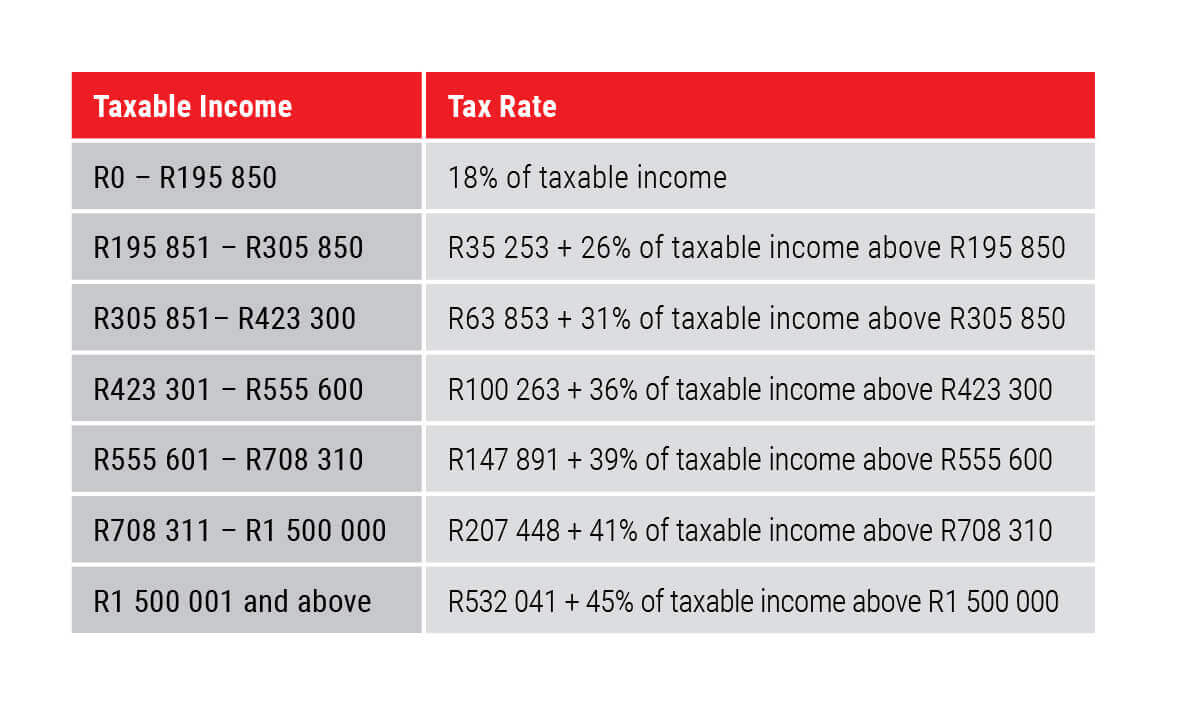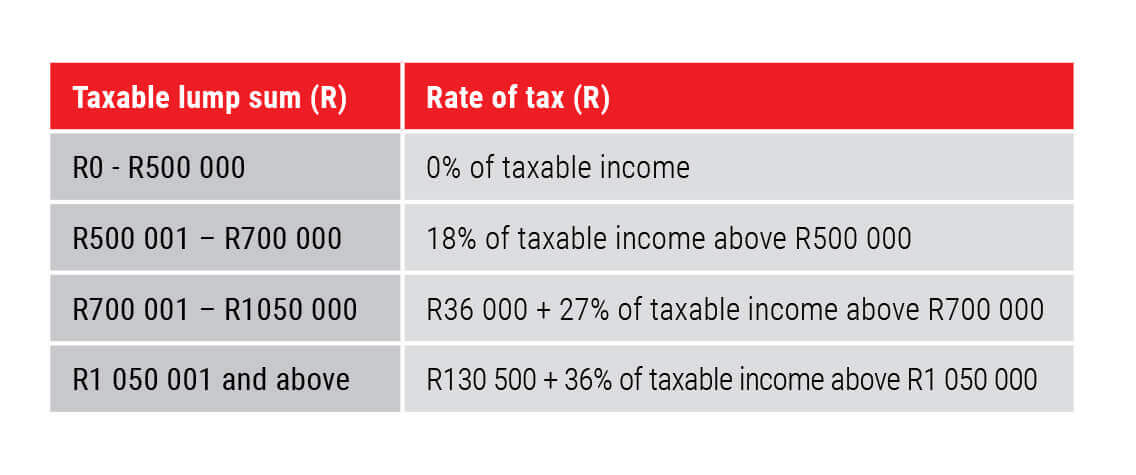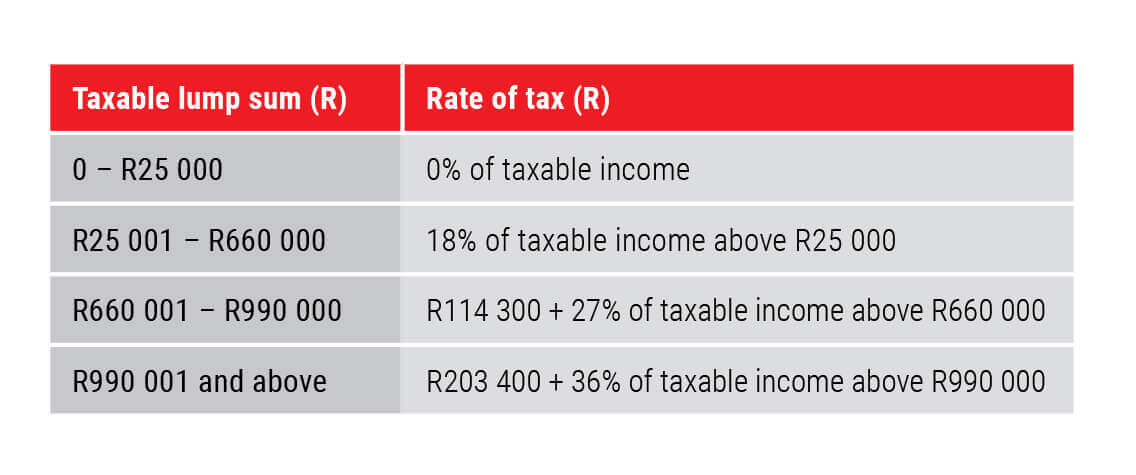Finance Minister Tito Mboweni delivered his maiden budget speech on Wednesday 20 February. In this document we highlight some of the 2019 Budget tax proposals that may impact investors. These changes come into effect on 1 March 2019.
No surprise tax increases in the Budget
This year’s Budget announced no surprise tax increases, unlike last year’s 1% VAT hike. Instead, the focus shifted from revenue collection to restoring the public’s confidence in the credibility of the revenue collector by prioritising the appointment of a permanent Commissioner in the coming weeks; reinstating the SARS Large Business Unit; and increasing the efficiency of tax collections by focusing on enforcement and embracing new technology. To limit the negative impact on economic growth, the 2019 Budget proposals will not increase tax rates in any category. Instead, revenue collections will be increased by not adjusting the income tax brackets for inflation. This is commonly referred to as ‘bracket creep’ and is an effective way to raise revenue as the impact on household income is not immediately evident to the public.
What were the key changes?
The highlights from this year’s Budget are summarised below:
- No changes will be made to personal income tax brackets, while the tax-free threshold increases slightly. By not adjusting the income tax brackets for inflation, the government is expecting to raise R12.8 billion in revenue.
- No adjustments to the medical tax credits. This will raise R1 billion in revenue.
- Increases in fuel taxes, together with the carbon tax on fuel, will raise R1.3 billion.
- Increases in alcohol and tobacco excise duties will raise revenue of R1 billion.
- Additional VAT zero-rated items will be introduced from 1 April 2019 (including white bread flour, cake flour and sanitary pads)
The following applies for the period from 1 March 2019 to 29 February 2020:
Tax thresholds
There has been a slight upward adjustment of the tax-free thresholds for personal income taxes to the following:
- R79 000 for taxpayers younger than 65
- R122 300 for taxpayers age 65 to 74
- R136 750 for taxpayers age 75 and over
Rebates
The primary, secondary and tertiary rebates (deductible from tax payable) were slightly increased to the following:
- R14 220 per year for all individuals
- R 7 794 for taxpayers age 65 and over
- R 2 601 for taxpayers age 75 and over
What has not changed?
Individuals and special trusts
There were no adjustments to the personal income tax brackets this year. This means that taxpayers earning above R195 850 will continue to fall into the 26% tax bracket. The highest marginal tax rate for individual taxpayers remains unchanged at 45%. The personal income tax rates for the 2019/2020 tax year are listed below.

Companies and trusts
The income tax rates for companies and trusts (other than special trusts) remain unchanged at 28% and 45%, respectively.
Medical tax credits
Monthly tax credits for medical scheme contributions remain as follows:
- R310 per month per beneficiary for the first two beneficiaries
- R209 per month for each additional beneficiary
Interest exemptions
The local interest exemptions remain unchanged:
- The exemption on interest earned for individuals younger than 65 years remains R23 800 per annum.
- The exemption for individuals 65 years and older remains R34 500 per annum.
Foreign interest remains fully taxable.
Dividends tax
Dividends tax remains at 20% on dividends paid by resident and non- resident companies in respect of shares listed on the JSE.
Foreign dividends received by individuals from foreign companies (shareholding of less than 10% in the foreign company) are taxable at a maximum effective rate of 20%.
Interest withholding tax for non-residents
Interest withholding tax remains at 15% on interest from a South African source payable to non-residents. Interest is exempt if payable by any sphere of the South African government, a bank or if the debt is listed on a recognised exchange.
Tax-free savings account
The annual cap on contributions to tax-free savings accounts remains at R33 000 with a lifetime limit of R500 000.
Retirement lump sum taxation
At retirement
The first R500 000 of a retirement lump sum remains tax-free. The table below illustrates how retirement lump sums will be taxed:

Pre-retirement
The first R25 000 of a pre-retirement lump sum withdrawal remains tax-free. The table below illustrates how withdrawal lump sums will be taxed:

Capital gains tax (CGT)
The capital gains tax inclusion rate for individuals and special trusts remains at 40%, and for other taxpayers at 80%.

The annual exclusion for a capital gain or loss granted to individuals and special trusts remains at R40 000. The exclusion granted to individuals remains R300 000 in the year of death.
Value-Added Tax (VAT)
VAT is charged on the supply of goods and services provided by registered vendors. It remains at 15%.
Estate duty
Estate duty is levied on property of residents and South African property of non-residents less allowable deductions. The duty is levied on the dutiable value of an estate at a rate of 20% on the first R30 million and at a rate of 25% above R30 million.
A basic deduction of R3.5 million is allowed in the determination of an estate’s liability for estate duty.
Donations tax
Donations tax is payable at a flat rate on the value of property disposed of by donation. It is levied at a flat rate of 20% on the value of property donated, while any donations exceeding R30 million in one tax year will be taxed at a rate of 25%.
The first R100 000 of property donated in each year by an individual is, however, exempt from donations tax. This amount remains unchanged from last year.
Additional tax amendments proposed for the 2019 legislative cycle
Refining the foreign employment income tax exemption for South African residents
From 1 March 2020, South African residents who spend more than 183 days in employment outside the country will be subject to South African taxation on any foreign employment income that exceeds R1 million. To prevent monthly withholding of income tax both in South Africa and the host country, it is proposed that South African employers be allowed to reduce their monthly local pay-as-you-earn (PAYE) withholding by the amount of foreign taxes withheld on the employment income. Before implementation, a workshop will be held to consult taxpayers on their administrative concerns. Any resulting amendments will be processed during the 2019 legislative cycle.
Retirement reforms
Once a member of a retirement fund retires and receives an annuity as a retirement benefit, any contributions to the retirement fund that did not qualify for a deduction when determining the member’s taxable income are tax-exempt. This exemption does not apply to annuities received from a provident or provident preservation fund.
To encourage annuitisation (regular payments in retirement), it is proposed that this exemption be extended to provident and provident preservation fund members who receive annuities. The exemption would apply for contributions made after 1 March 2016.
Study on the tax treatment of amounts received by portfolios of collective investment schemes
In 2018, amendments were proposed in the Taxation Laws Amendment Bill to tax the profits of some collective investment schemes as revenue instead of capital. After reviewing the public comments on this draft, government decided that more time is needed for it to work with industry to find solutions that will not negatively affect the relevant groups. This study is proposed for the 2019 legislative cycle.